What is a Sensory Impairment?
Sensory impairment is a condition where one or more of the senses we rely on every day are no longer functioning as expected.
We rely on our sight, hearing, touch, smell and taste every day without thinking too much about it. Our senses work in balance and help us react accordingly to every stimulus. But what happens when one of these senses becomes impaired?
People with sensory impairment have a different reality than the rest of us. They don’t experience the world the same way as most people do due to hearing loss or sight loss. There are different levels of sensory impairments, but it is possible to live independently with this condition with the right aid and support system.
What is Dual Sensory Impairment?
Dual sensory impairment is a combination of both hearing and vision loss. While both often happen due to the natural ageing process, profound hearing loss and sight loss can result from hereditary factors, other health conditions and head trauma.
Also another term used to describe this condition is “deafblind”, which describes a combined sight loss and hearing impairment. Dual sensory loss or deafblindness affects a person’s ability to communicate, get around, access and learn new information. It is also sometimes called multi-sensory impairment.
Multi-Sensory Impairment (MSI)
Multi-sensory impairment or MSI describes having more than one sensory impairment. MSI doesn’t affect everyone the same. Each person with a multi-sensory impairment will experience the world in their own unique way. There are a few stages of dual sensory loss or MSI:
- Mild multi-sensory Loss
- Moderate multi-sensory Loss
- Severe multi-sensory Loss
- Profound multi-sensory Loss
People with a single sensory impairment can use their more developed senses to get around and communicate with the world around them. On the other hand, children and young adults with MSI face more challenges but rely on their sense of smell, for example, and use it to identify places and people.

Sensory Impairment in Children
Children with some form of sensory impairment must be assessed individually, as their hearing and vision varies from child to child. Although they are all different, all children with sensory impairment have challenges with the following:
- Communication
- Mobility
- Access to information
Early intervention in children with hearing loss can help improve non verbal communication as well as language and speech development. Also, for a child with sight impairment, most learning occurs through exploration and repetition and learning how to use fine and gross motor skills.
Sensory Impairment in Adults
Age-related sensory impairment, especially sight impairment and hearing impairment, may have the most significant impact on the health of older adults.
Ageing is often associated with a decline in sensory function, which is a critical component of the quality of life of older people. Hearing Loss, for example, is increasingly common as we age and affects about one-third of people aged 60.
For example, the negative impact of sight loss has been related to higher risks of depression. However, research shows that using aids such as hearing aids, low-vision devices and training in blindness is associated with improved mental health in adults.
Examples of Sensory Impairment
Some causes of sensory impairment could include genetic factors, injury, environmental factors or other health conditions. Some can be corrected, but others are most often long-life conditions. The main characteristics of a person that is sensory impaired include:
- Blindness
- Low vision
- Hearing loss
- Deafness
- Deafblindness
- Sensory processing disorder
Visual Impairment and Blindness
Visual impairment is a decreased ability to see, causing vision problems that are not fixable by simple solutions such as glasses. Blindness, on the other hand, is a condition where a person cannot see at all and is severely sight impaired.
Today, many blind and visually impaired people adjust to their disabilities and live their lives just like everyone else. We see examples of visually impaired people that win awards, work their dream job and become successful in their work.
Being visually impaired is about something other than what someone can or cannot do. It’s about learning a new way to accomplish new goals.

Hearing Loss and Deafness
Hearing impairment is defined as the total or partial inability to hear sounds. There are three most common types, some of which can be corrected with the help of a hearing aid.
- Hearing Loss – reduced ability to hear sounds as other people hear them or moderate hearing loss, which can be corrected with hearing aids
- Deafness – lack of hearing and being unable to understand speech through hearing or a significant hearing loss
- Profound deafness – total lack of hearing and being unable to detect sound at all
Deaf Blindness
Deaf blindness is a combination of hearing and vision impairment to such an extent that it is almost impossible for the impaired senses to compensate for each other.
Deafblind people will have a unique experience of the world. For the people that can hear and see, the world is as wide as their eyes and ears can reach, but for someone who is deafblind, the world is much narrower.
Deaf blindness can be congenital, meaning someone can be born with hearing and vision impairment. However, there’s also acquired deafblindness which occurs later in life primarily through injury, illness, or ageing.
Sensory Processing Disorder
Sensory processing disorder is a neurological condition that affects the body’s ability to collect information from the senses and then convert this information into appropriate behavioural and motor responses.
SPD inhibits a person’s ability to filter sensory information and can make people feel over-stimulated in specific environments. It’s not uncommon to feel overwhelmed by flashing lights or loud noise, but for people with a sensory processing disorder, these sensations are disruptive to their everyday life.
Living with Sensory Impairments
Sight and hearing impairments impact all people differently. A person’s sensory impairment has to be seen in the context of their ability to function in their environment.
That’s why managing these conditions can be approached in various ways, from reorganising the environment to adapting the tasks through play or toys or learning new strategies to allow people with a sensory impairment to self-manage their needs. This is something that our support workers at Unique Community Services do best.
We often see people that are sensory impaired or with vision and hearing problems self-isolate and even get depression, affecting their daily activities, safety and independence. However, through emotional support, assistive technology, and reasonable adjustments, we can see a decrease in social isolation and improved confidence in people with sensory impairments.
How Unique Community Services Supports People with Sensory Impairment?
Rather than focusing on doing things TO people, our team at Unique Community Services focuses on doing things WITH people. Our team embraces the differences and uniqueness in everyone and emphasises what people CAN DO.
Our mission is to create a safe space for people with sensory impairments and work on their strengths to make a life-changing impact on the person we care for and for their families.
With offices in Manchester and Leeds, Unique Community Services is now closer to you and available 24/7. Contact us by email or phone to see how our team can support your loved one.
